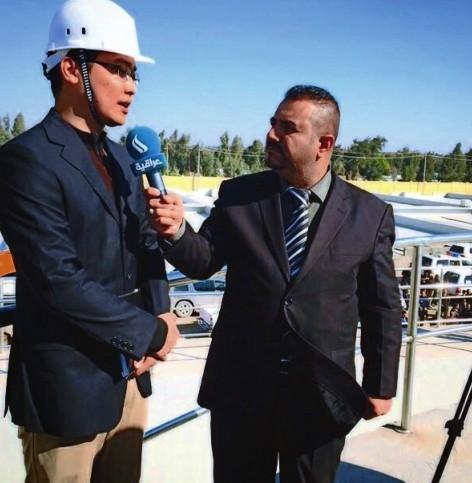CNEEC: Participant in Iraq’s Reconstruction
By XIAN JUN
AFTER the United States army withdrew from Iraq in 2012, the Iraqi central government approved a dozen infrastructure projects to be undertaken with foreign enterprises. The government expected through these landmark projects to quickly renovate the countrys aging or damaged infrastructure and cultivate engineering talents.
Under this context, Iraqs Ministry of Municipal Administration and Public Utilities awarded the China National Electric Engineering Co. (CNEEC) a contract worth RMB 500 million to build a sewage treatment plant in Hillah, capital of Babylon province. The project, expected to be completed this December, will fundamentally improve the citys inefficient sewage collection and processing systems.
Improve Executive Capability
According to the agreement, CNEEC is responsible for constructing the sewage treatment system and designing the urban pipeline network. Local contractors will follow up in building the pipeline network with CNEEC as consultant. The collaboration will accelerate CNEECs localization and at the same time improve the executive capacity of local engineering companies.
At the current stage, CNEEC is focusing on installation work and debugging facilities, a key part of the contract. The sewage treatment has, at its technological core, adopted an internationally proven technique: the Carrousel oxidation ditch. The equipment is provided by DHV b.v. of the Netherlands, a world leading biological wastewater treatment process engineering company.
As general contractor, CNEEC purchased state-of-the-art facilities and corollary equipment for the project, so as to satisfy design requirements. It has instituted operation monitoring and control equipment at all linkages through a tailor-made automaticcontrol program. After careful local debugging and debugging of automatic controls, the project will be delivered to the client.
Overcoming Difficulties
The project faced unexpected challenges during construction. As the security situation in Hillah is worrying, security was a first and foremost concern.
In June 2014, when ISIS launched its first terrorist attack targeting Iraq, refugees flocked southward from Mosul to Baghdad and Babylon province. Some in the crowd looted shops on Hillahs main streets, causing public safety concerns, although it was difficult to distinguish terrorists from refugees.
The CNEEC project department paid close attention to the situation and its development. Guided by the Chinese embassy in Baghdad and with the help of Chinese security consultants, the company drew up and regularly updated a set of security plans. This enabled them to cope with the local situation and prepare the necessary resources for evacuation. To be ready for contingencies, all workers were required to take part in the security drill after working hours.
Project funding was another problem. One of the worlds top crude oil exporters, Iraq has suffered from plummeting oil prices on the global market these past several years. Worse still, it has had to allocate large sums towards fighting terrorist organizations. These two factors depleted the countrys finances, forcing the government to dip into its financial allocations for the next two years.
Earlier this year, Iraqi civil servants had not been paid for several months, and ordinary people had to make ends meet through their savings. The Ministry of Municipal Administration and Public Utilities, meanwhile, had been unable to pay various contractors since December 2014. The sewage treatment plant project –which involves huge material and labor costs – depends entirely on funding from the Iraqi central government. It thus fell to CNEEC, as the project executor, to rapidly find a solution to this stumbling block as the work on it would otherwise stall.
The last but not least challenge was that of different engineering standards. As CNEECs business manager for this project, I have been in charge of the work for almost three years. At the start, after perusing Iraqi laws and regulations on project contracting, I noticed that local executive units were still using British engineering standards from the 1980s, yet its current engineering laws and regulations used the International Federation of Consulting Engineers(FIDIC) as a reference. I assumed that the Iraqi project directors would adhere to international standards to ensure smooth communication between Chinese and local engineers.
But there is always a gap between plans and on-the-ground situations. As there are big differences between China and the United Kingdoms engineering standards, not many Chinese designers and construction units are familiar with the latter. It is important to note that, after years of research and revisions, the scientificity and feasibility of Chinese engineering standards are now equal to those of the U.S., U.K. and major European countries.
During discussions for plan approval, Chinese designers patiently explained project details to the Iraqi engineers, especially design considerations and internal scientificity.
“The 10-year Iraq War left the country devastated. Whats gone is not only the citys fine appearance and peoples stable life, but also excellent talents, such as engineers and teachers. The skills of young engineers in Iraq have obviously fallen behind those of the previous generation,” said Director Murad of the Design Department at the Ministry of Municipal Administration and Public Utilities.“Young engineers at construction sites hope to learn practical knowledge and skills from their Chinese counterparts,”he added.
Support from China
China actively participates in Iraqs reconstruction, strictly controlling every Chinese unit involved. CNEECs project department communicates closely with the Chinese embassy in Baghdad. As a growing number of Chinese enterprises enter the Iraqi market, CNEEC, one of the Chinese pioneers in the country, has provided others with necessary assistance through the embassy and local Chinese chamber of commerce.
CNEEC attaches great importance to this sewage treatment project. In light of Iraqs financial difficulties, the company approved the request to advance expenditure payments so that the project could be completed as soon as possible, so hoping to establish a good reputation in this market. Without the companys substantial support, the project would not have achieved its current level of completion.
There is still work to be done, but this sewage treatment project will definitely benefit the Iraqi people.

